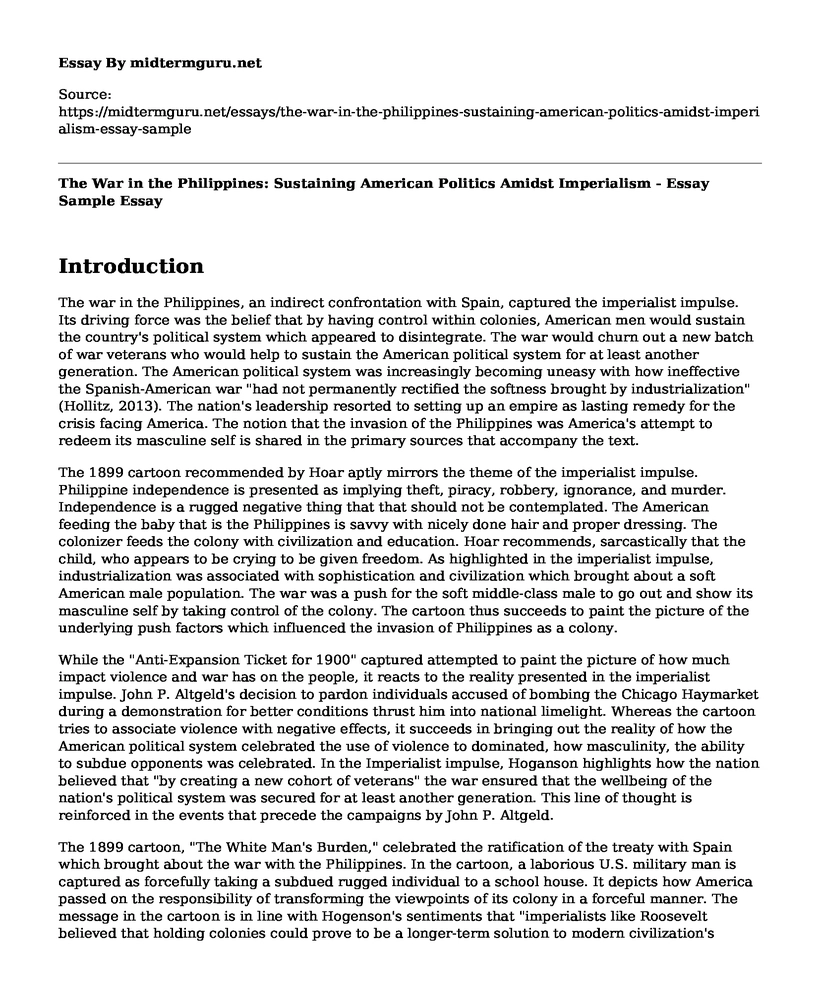Introduction
The war in the Philippines, an indirect confrontation with Spain, captured the imperialist impulse. Its driving force was the belief that by having control within colonies, American men would sustain the country's political system which appeared to disintegrate. The war would churn out a new batch of war veterans who would help to sustain the American political system for at least another generation. The American political system was increasingly becoming uneasy with how ineffective the Spanish-American war "had not permanently rectified the softness brought by industrialization" (Hollitz, 2013). The nation's leadership resorted to setting up an empire as lasting remedy for the crisis facing America. The notion that the invasion of the Philippines was America's attempt to redeem its masculine self is shared in the primary sources that accompany the text.
The 1899 cartoon recommended by Hoar aptly mirrors the theme of the imperialist impulse. Philippine independence is presented as implying theft, piracy, robbery, ignorance, and murder. Independence is a rugged negative thing that that should not be contemplated. The American feeding the baby that is the Philippines is savvy with nicely done hair and proper dressing. The colonizer feeds the colony with civilization and education. Hoar recommends, sarcastically that the child, who appears to be crying to be given freedom. As highlighted in the imperialist impulse, industrialization was associated with sophistication and civilization which brought about a soft American male population. The war was a push for the soft middle-class male to go out and show its masculine self by taking control of the colony. The cartoon thus succeeds to paint the picture of the underlying push factors which influenced the invasion of Philippines as a colony.
While the "Anti-Expansion Ticket for 1900" captured attempted to paint the picture of how much impact violence and war has on the people, it reacts to the reality presented in the imperialist impulse. John P. Altgeld's decision to pardon individuals accused of bombing the Chicago Haymarket during a demonstration for better conditions thrust him into national limelight. Whereas the cartoon tries to associate violence with negative effects, it succeeds in bringing out the reality of how the American political system celebrated the use of violence to dominated, how masculinity, the ability to subdue opponents was celebrated. In the Imperialist impulse, Hoganson highlights how the nation believed that "by creating a new cohort of veterans" the war ensured that the wellbeing of the nation's political system was secured for at least another generation. This line of thought is reinforced in the events that precede the campaigns by John P. Altgeld.
The 1899 cartoon, "The White Man's Burden," celebrated the ratification of the treaty with Spain which brought about the war with the Philippines. In the cartoon, a laborious U.S. military man is captured as forcefully taking a subdued rugged individual to a school house. It depicts how America passed on the responsibility of transforming the viewpoints of its colony in a forceful manner. The message in the cartoon is in line with Hogenson's sentiments that "imperialists like Roosevelt believed that holding colonies could prove to be a longer-term solution to modern civilization's seemingly dangerous" softening of the middle class American young men. As such, 'imperialists wanted to build manly characters" out of its young men (Hollitz, 2013). In the cartoon, the American military man uses physical dominance to subdue his captor and force them into what the system deems right for them.
In the cartoon "The Filipino's First Bath", at he background is the image of the Capitol Hill, depicting the strings pulled by the political elite to ensure that the country took charge of the colony to safeguard its future political interests. The Filipino is captured as a young boy with crude weapons on his hand and rugged hair. The cleaning is rather rough given the use of a brush. The Filipino is subdued by the rather towering American man tasked with cleaning it. The message of the cartoon is clear. America supported the use of brute force to make the Filipino to conform with its ideas and ideals. In the process, the Individuals tasked with the cleaning came out as heroes. The point was to revert the thinking of the young people from the comfortability that made them weak as is the case with the two men in the background and gave them prominence by taking back their place.
Theodore Roosevelt wonders in "The Strenuous Life" how the desire to be peaceful and self-respecting secured the position of America. From the statement, his support for the use of violence to secure the masculinity of the American people was evident. He was opposed to the preference for a soft lifestyle which the young men had adopted having grown in an environment of abundance. Like in the Imperialist's Impulse, he made clear the belief of the American system that war was the sure path to securing the position of America for years to come. That Americans needed to think aggressively so as to make other nations compliant.
References
Hollitz, J. (2013). Thinking Through the Past: A critical thinking approach to U.S. History. Cengage Learning.
Cite this page
The War in the Philippines: Sustaining American Politics Amidst Imperialism - Essay Sample. (2022, Dec 26). Retrieved from https://midtermguru.com/essays/the-war-in-the-philippines-sustaining-american-politics-amidst-imperialism-essay-sample
If you are the original author of this essay and no longer wish to have it published on the midtermguru.com website, please click below to request its removal:
- Essay Sample on Realism vs Liberalism
- History Essay Example: Roman Civilization
- Biggest Challenges Community Policing Face - Essay Example
- Research Paper on International Relation: War Between the U.S. And North Korea
- US Drug Policy: Improving Public Health & Safety - Essay Sample
- The Civil War: Slavery at the Core of Sectional Conflict - Essay Sample
- Big Lie: Communist Oppression & Deception Exposed - Essay Sample







